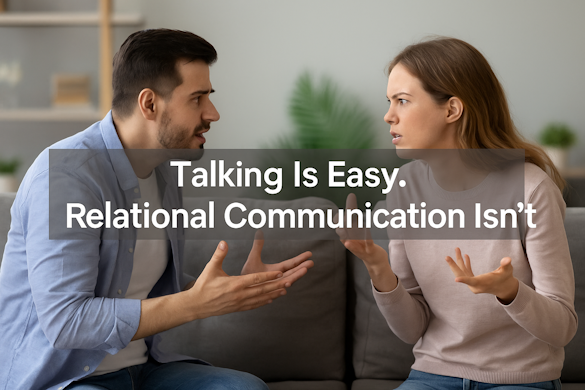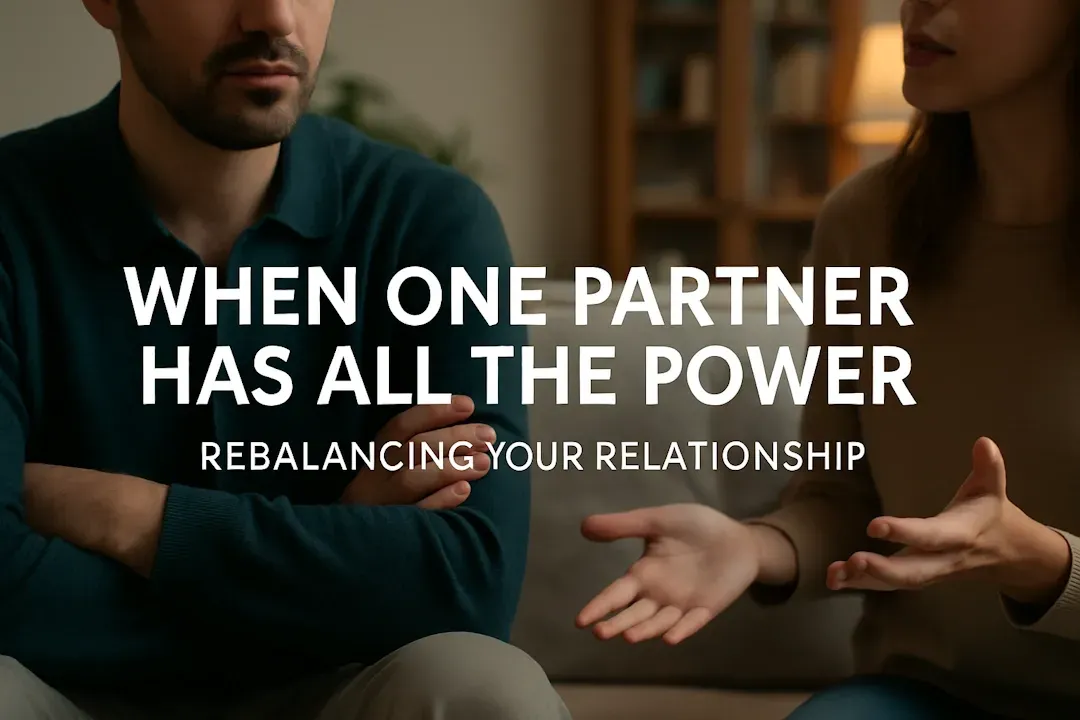Talking Is Easy. Relational Communication Isn’t.

You’ve probably heard it before—“Communication is everything in a relationship.”
But if that were true, couples who talk a lot wouldn’t still be stuck, resentful, or drifting apart.
The truth is, communication alone doesn’t fix anything. It’s not just about saying the right words. It’s about how you show up when things are hard—and whether you’re willing to speak honestly, take ownership, and actually listen.
At RLT Marriage Counselling, I see this every day. Most couples don’t lack words—they lack skills, clarity, and the ability to hold tough conversations without collapsing into blame, avoidance, or shutdown.
Let’s unpack what real relational communication actually looks like.
Why Communication Breaks Down—Even When You’re “Talking”
Most communication problems aren’t about vocabulary.
They’re about tone, timing, safety, and power dynamics.
Here’s what that might sound like in your relationship:
- You “talk it out,” but nothing ever really gets resolved
- One partner dominates the conversation, while the other shuts down
- You feel like you're walking on eggshells or tiptoeing around each other's moods
- You hear the words, but you don’t feel heard
The problem? You’re not just miscommunicating. You’re in a loop of reactivity, where old habits, unspoken resentments, and defensive patterns drive the interaction.
And most of us don’t even realize it while it’s happening.
We just feel justified in our response—and that’s the trap.
What Real Communication Requires (The RLT Perspective)
In Relational Life Therapy (RLT), communication isn’t just a tool. It’s a reflection of your relational maturity. And it requires three core skills:
1. Radical Honesty
This isn’t about brutal truth-telling or saying whatever’s on your mind. It’s about sharing your experience with accountability. That means:
- Naming what you feel without blaming your partner
- Admitting when you’re hurt and when you’ve caused hurt
- Being clear, not cruel
Honesty without kindness is control.
Kindness without honesty is avoidance.
2. Non-Defensive Listening
Listening isn’t nodding politely while you wait for your turn to speak. It’s staying in the room—mentally and emotionally—long enough to hear your partner’s truth without reacting.
In RLT, we practice how to:
- Breathe through your internal “charge”
- Reflect what your partner said without rewriting it
- Listen to understand, not correct
This builds trust—not just in your partner, but in your own ability to handle discomfort.
3. Speaking From the “I”
Blame keeps the conversation stuck. Ownership moves it forward.
Instead of “You never listen to me,” try:
“I feel dismissed when I don’t get to finish my thought.”
Instead of “You’re always criticizing me,” try:
“I feel anxious when feedback comes without appreciation.”
These small shifts make a big difference.
But Here’s the Hard Truth…
Most of us don’t pause and reflect.
We react from the part of us that feels unseen, unappreciated, or wounded.
And that part isn’t going to be calmed by advice.
It needs someone to catch it in the moment and say:
“Hey—this isn’t about what’s happening right now. This is older. Can we slow it down?”
This is where coaching, support, or guided relational work can be so helpful—not as a rescue mission, but as a mirror. When you’re caught in your own pattern, it’s hard to see it clearly. Support helps interrupt the cycle in real time so you can practice something new.
Simple Shifts You Can Practice Now
You don’t have to get it perfect. You just have to start practicing differently.
🧭 Set a 20-Minute Connection Window
Phones off. No multitasking. Just presence.
Let one person speak without interruption. Then switch. Use a timer if needed.
🛑 Use a Relational Time-Out
When things start to spiral, hit pause—not by storming off, but with intention:
“I want to keep talking about this, but I need 10 minutes to clear my head so I can come back better.”
🎯 Start With Your Values
Begin hard conversations by anchoring in care:
“I love you. I want us to get this right. I might not say it perfectly, but I’m in this with you.”
🛠 Choose One Skill to Focus On
Pick one—mirroring, “I” statements, or naming physical sensations—and practice it for a week. One skill at a time builds real confidence.
Final Thought: You Can’t Talk Your Way Out of What You Behave Into
Communication isn’t just about words.
It’s about courage. It’s about ownership. It’s about being willing to recognize when your reactions are speaking louder than your values.
If you want to communicate better, don’t just focus on what you say.
Focus on how you show up—especially when it’s hard.
That’s where the real work begins.
And that’s where lasting change starts
Relationship Solutions Blog










